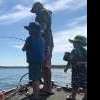Many great fisherman can not be good fishing guides because they are terrible at helping other anglers catch fish. A guides job is to do what ever they can to insure that you have the best possible day on the water That usually translates in to what they can do to help you catch fish. It is your trip. Your guide should do what you want them to. If you want them to fish with you than of course it would be OK if they fished. If they want you to use a certain technique you are not comfortable with, or otherwise don't like to use, than they can either teach you the technique, go to another location where another technique will work, or simply let you fish your way, but you will have to understand that your way may not be as productive as what your guide would like you to fish.
If while trying to teach you the technique that is working, they have to demonstrate how properly present the lure, or bait, what a bite feels like, and how or when to set the hook, than obviously they may need to fish in order to be an effective teacher. Once you are able to replicate what they are doing, they should stop fishing. Sometimes if you are struggling to learn a technique, a guide may have to fish simply to see if the technique will work if done properly. This should only take a few casts, and they should be able to tell right away if the method is working in that location. Many times it may be best to let the guide make the first cast or two at a new location in order to determine if they want to spend any time there. That does not mean they should pull up to a spot, cast at the only log, land a bass then leave, but waiting for the client to determine if the bass are at a new location can take more time than a guide may want to spend. They may be able to make a couple casts and instantly be able to tell if the new location is worth spending any time at. In this situation communication is key to help alleviate any misunderstandings. When a location and technique is working for you they may want to try another presentation, while you are catching fish on the original method, and it would be wise for you to let them. They may discover a more successful technique, or one that you have less difficulty mastering. They generally should not continue to fish a method that has already been determined to be successful, or the same presentation that you are using.
When I am guiding the last thing I want to do is catch a fish on a technique that I know is working, or one that I don't think my client will be able to master in the short time I have to teach them. I am always evaluating their skills, and trying to determine if there is another presentation, or location, where they can catch fish, with as little frustration as possible. There is always another piece to a fishing puzzle, and that goes double if you have to put a fishing puzzle together for someone else. If you want your guide to fish the same technique at the same time than that is OK, but only if you insist and don't be surprised if your guide still keeps switching baits. It is generally in a guides DNA to constantly be experimenting, looking for something new to improve the clients day. A good guide knows they can catch fish, but what they want is for you to catch fish.
In general the only time a guide should fish is if by them fishing it will help you catch more fish, and or help you enjoy your day.
A good guide wears many hats. They should be good fisherman, great teachers, excellent communicators, good listeners, story tellers, and over all fun people to be around. Their only concern besides your safety should be that you have as enjoyable day as possible. Most of the time that does not include the guide fishing

.thumb.jpg.d431b5daa6ef35470410602b9be6f3ae.jpg)
